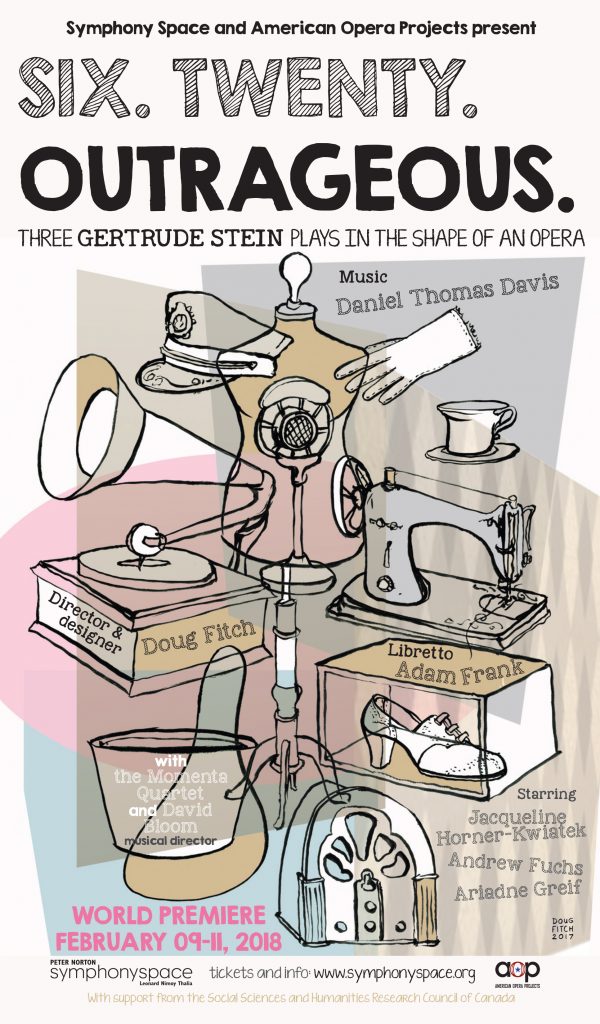 NETWORK
NETWORK
Musical America has developed the most advanced search in the international performing arts industry. Click on the tabs below to identify the managers, artists, presenters, businesspeople, organizations and media who make up the worldwide performing arts community.

Management companies that advertise in the print edition have a hyperlink to their Artist Roster.
(If you would like to advertise in the Directory and receive the benefit of having your roster appear in this database, please click here.)
Choral Groups
Dance Companies
Orchestras
International Concerts & Facilities Managers
US/Canada Facilities
US/Canada Performing Arts Series
Festivals
Record Companies

1961 Rose Ln.
Pleasant Hill, CA 94523
(925) 689-3444
Reviews
A New Gertrude Stein Opera: Chutzpah Rules
 NEW YORK -- Gertrude Stein is remembered as a highly innovative, idiosyncratic writer who helped to shape early modernism in poems, plays, and such memorable novels as The Autobiography of Alice B. Toklas and The Making of Americans. Her collaboration as librettist with composer Virgil Thomson resulted in two of the 20th century’s most adventurous and critically esteemed operas: Four Saints in Three Acts and The Mother of Us All. It takes no small amount of chutzpah to make another opera based on her work.
NEW YORK -- Gertrude Stein is remembered as a highly innovative, idiosyncratic writer who helped to shape early modernism in poems, plays, and such memorable novels as The Autobiography of Alice B. Toklas and The Making of Americans. Her collaboration as librettist with composer Virgil Thomson resulted in two of the 20th century’s most adventurous and critically esteemed operas: Four Saints in Three Acts and The Mother of Us All. It takes no small amount of chutzpah to make another opera based on her work.
With SIX.TWENTY.OUTRAGEOUS, composer Daniel Thomas Davis and librettist Adam Frank have done just that, adapting three of Gertrude Stein’s plays from the 1910s to serve as the basis for a new piece. Workshopped with American Opera Projects, with the estimable Doug Fitch on board as director and designer, the opera premiered last weekend at Symphony Space’s Leonard Nimoy Thalia Theater. I caught the third, February 11 performance.
Fitch’s design made the best use possible of the limited playing space; he also gave the audience entertaining cues as to the period nature of the piece. Playful cloud mobiles drifted above the piano. A painting of a nude woman with a plethora of eyeballs stood in for Stein’s fascination with Cubism. Large replicas of a phonograph, sewing machine, a dress form adorned by shiny cloth, and an old-fashioned radio were pivotal props.
All three performances were sold out and, at the last one, it didn’t appear that an intermission did anything to thin the ranks of the enthusiastic crowd—a rarity for a new work based on challenging texts. Stein was an author not averse to verbal contortions, often reveling in complex wordplay and extensive repetitions. Meaning and narrative are both allusive and, at times, elusive in her plays, and Frank’s adaptation savors rather than blunts these qualities. The plot of 6.20.O is diffuse by design. Each act is taken from a different Stein play, with phrases occasionally brought back to thread things together. The first act centers on parlor games; the second on relationships. The third is about an election night party that goes horribly awry (sound familiar?).
To the credit of the four singers in the cast, every word of the text was enunciated clearly, although mileage varied on the quality of the singing. Mezzo-soprano Jacqueline Horner-Kwiatek, whose character was called V but was costumed to clearly depict Stein, was the standout, singing with poise and rich tone. Tenor Andrew Fuchs played ME, dressed in drag to resemble Toklas, and was tasked with a Frankensteinian part deployed from baritone to countertenor registers. Initially impressive in the role’s versatile demands, he had a hard time in the third act, his voice flagging under the strain of amplified accompaniment and relentless repeated high notes. Soprano Ariadne Greif play THREE, dressed as a maid but acting like a housekeeper with a decidedly rebellious streak. Also presented with a rangy role, Greif sang quite beautifully, particularly in ensemble passages, where she blended seamlessly with her colleagues. Joseph Atkins played the character WE, who undertook the spoken part of good-natured MC in the first two acts, only to sing piercingly through a microphone and play synthesizer in the third act, enacting an “increasingly deranged” radio. The synth he played was out of tune with the onstage piano, which added another layer of chaos to his evolved role in the proceedings.
The other musicians were also enlisted for onstage business, including bits of spoken dialogue, simple choreography, and the occasional sight gag. The Momenta String Quartet – violinists Emilie-Anne Gedron and Alex Shiozaki, violist Stephanie Griffin, and cellist Nicholas Haas – joined by the pianist Dmitri Dover, acquitted their theatrical activities gamely and managed razor-sharp musical focus to boot. Their multi-tasking was most impressive.
Davis’s score is eclectic in design. Like Thomson, he has an affinity for early American hymnody and shape-note spirituals, materials he affectingly evoked. Repetition is omnipresent in Frank’s libretto, and Davis’s responses to it were varied. At its best, his music used minimalism as a touchstone juxtaposed with Americana tunes. In other places, he seemed to parody minimalism itself, using Philip Glass-style ostinatos to accompany the sewing machine, a grizzled trope that has often been used to critique the genre. Moreover, the final act employs text-painting that conveys Stein’s repetitions as if they were akin to the stuttering lines found in John Adams’ Nixon in China, which seems to contravene the graceful character found in Thomson’s (author-supervised) settings of Stein.
Dramaturgically, the piece comes apart in the third act as well, abandoning its previous period design to comment unsubtly on the 2016 elections. At one point, WE dons an impossibly large fur coat and stabs ME, who is reading election results in a newspaper, with a piece of the radio fashioned into a shiv. The denouement, while pleasing in that it restores “Alice B. Toklas” to life, is overlong.
Caveats aside, SIX.TWENTY.OUTRAGEOUS is imaginative, thought-provoking, and generous of spirit. The enthusiastic reception given its premiere suggests it will soon grace larger stages.










 RENT A PHOTO
RENT A PHOTO






